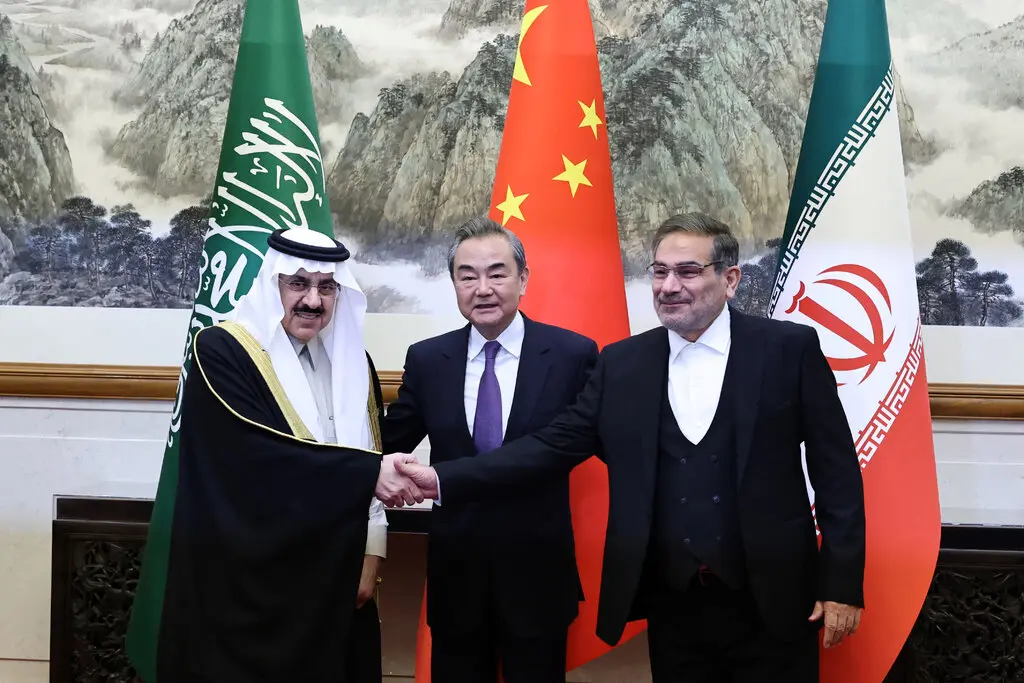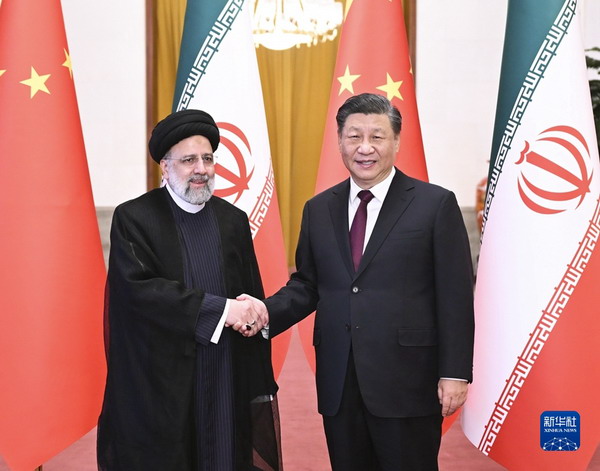
A photograph released by Chinese state media showing officials Wang Yi (center), with Ali Shamkhani, right, the secretary of Iran’s security council, and Musaad bin Mohammed Al Aiban, Saudi Arabia’s minister of state, in Beijing, on Friday, March 10, 2023.
Tehran/Beijing: In a significant move aimed at easing tensions in the Gulf region, the Arab world has welcomed the path-breaking meeting between old foes Iran and Saudi Arabia in Beijing recently. Many Middle East countries including Egypt, Algeria, Turkey, Iraq, Jordan, Kuwait, Oman, Lebanon, Bahrain and the United Arab Emirates have welcomed the talks. The spokesperson for UN Secretary-General António Guterres in a note welcomed the agreement reached between Iran and Saudi Arabia to resume diplomatic ties and expressed appreciation to China for promoting dialogue between the two countries. Secretary-General of the League of Arab States Ahmed Aboul Gheit praised the agreement, saying it would contribute to regional stability. Hissein Brahim Taha, Secretary General of the Organization of Islamic Cooperation (OIC) expressed the hope that this step would give new momentum to cooperation among OIC Member States.
“The international acclaim fully demonstrates that lasting peace, stability and security is the shared aspiration of regional countries and that upholding strategic independence and seeking solidarity and cooperation has strong backing from people worldwide,” China claimed today.
Chinese State Councilor and Foreign Minister Qin Gang noted that China will be a promoter of security and stability, a partner for development and prosperity and a supporter of the Middle East’s development through solidarity. “China will continue to contribute its insights and proposals to realizing peace and tranquillity in the Middle East and play its role as a responsible major country in this process. It is our hope that more and more countries will join us in implementing the GSI to realize enduring peace and universal security,” he said.
Wang Yi, a Member of the Political Bureau of the Chinese Communist Party (CCP) Central Committee and Director of the Office of the Central Commission for Foreign Affairs, said it was a victory for dialogue and a victory for peace.
Elaborating more on the Iran-Saudi Arabia agreement, the Chinese foreign ministry stated today that the Beijing dialogue was a “robust and successful effort” to put China’s Global Security Initiative (GSI) into practice. An agreement was reached and a joint tripartite statement was released. Saudi Arabia and Iran agreed to resume diplomatic relations. The three countries expressed their keenness to exert all efforts towards enhancing regional and international peace and security.
Significantly, while the United States welcomed the move, the New York Times reported that privately, Biden’s aides suggested too much was being made of the breakthrough, scoffing at suggestions that it indicated any erosion in American influence in the region.
Incidentally, less than a month ago, on February 15, 2023, senior officials of the United States (U.S.) and members of the Gulf Cooperation Council (GCC) had convened a meeting of the Working Group on Iran in Riyadh and condemned Iran’s “continued destabilizing policies, including its support for terrorism and the use of advanced missiles, cyber weapons, and Unmanned Aircraft Systems (UAS) and their proliferation in the region and around the world”.
Indirectly taking a dig at Washington, the Chinese foreign ministry today stated, “Tactics like “bolster one and bash the other” or “divide and rule” or “bloc confrontation” have never been proven to work on security issues. The viable approach to realize lasting peace and security in the region and beyond is to uphold the vision of common, comprehensive, cooperative and sustainable security, pursue the long-term objective of building a security community, and follow a new path to security featuring dialogue over confrontation, partnership over the alliance and win-win over zero-sum”.
Tehran already acknowledged the Beijing dialogue that resulted in the restoration of ties between Iran and Saudi Arabia will provide the two countries, the region and the Muslim world with “huge possibilities”. In a tweet on March 10, 2023, Iran’s Minister of Foreign Affairs Hossein Amir-Abdollahian said that the policy of neighbourliness as a key component of the 13th government’s foreign policy will keep moving in the right direction forcefully and the Foreign Ministry is seeking to actively take further steps in the region.
“Today, I received congratulation calls from the prime minister and foreign minister of Qatar as well as the foreign ministers of Iraq and Oman on the agreement between Iran and Saudi Arabia to normalize their ties and reopen embassies in Tehran and Riyadh,” he acknowledged.
China said the talks in Beijing have turned a new page in Saudi Arabia-Iran relations, paved the way for realizing peace and stability in the Middle East and set a “fine example” for resolving problems and disagreements between countries through dialogue and consultation.
“No matter how complex the issues are or how thorny the challenges may be, equal-footed dialogue on the basis of mutual respect will lead to a mutually acceptable solution. The Middle East belongs to the people of the region. Its future must be determined by the people of Middle East countries. Countries in the region have China’s support to carry forward the spirit of independence, strengthen solidarity and coordination, and join hands to make the Middle East more peaceful, stable and prosperous, Chinese foreign ministry spokesperson Wang Wenbin told reporters in Beijing today.

It may be mentioned that it was during the state visit of China by Iranian President Ebrahim Raisi last month that Chinese President Xi Jinping noted that safeguarding stability in the Middle East concerned the well-being of countries and peoples in the region, and was of vital importance for safeguarding world peace, promoting global economic development and ensuring a stable energy supply.
Xi then appreciated Iran’s willingness to actively improve relations with its neighbouring countries and offered his support to the countries in the region in resolving conflicts through dialogue and consultation to achieve good neighbourliness and friendship.
“China stands ready to continue to play a constructive role in promoting regional peace and stability. China is ready to strengthen communication and coordination with Iran on multilateral platforms such as the United Nations and the Shanghai Cooperation Organization (SCO), to practice true multilateralism and safeguard the common interests of developing countries,” Xi had told Raisi.
Wenbin today disclosed that in response to the initiative of Jinping of China’s support for developing good neighbourly relations between Saudi Arabia and Iran, the delegations from the two countries recently held talks in Beijing, which yielded important outcomes.
– global bihari bureau





